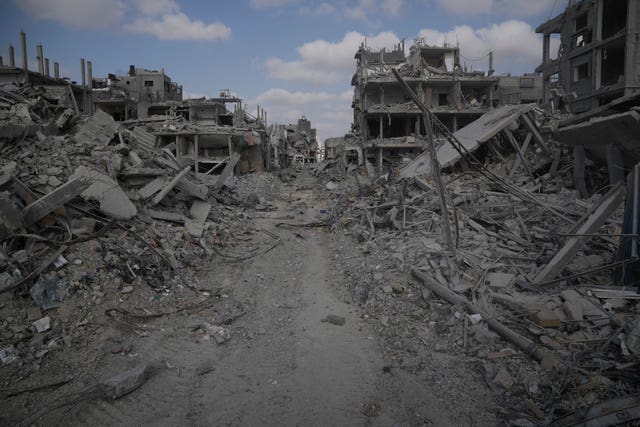Blinken urges Israel to seek deal as truce efforts remain stalled
The US Secretary of State wrapped up his 11th visit to the region since the war began, with no sign of any ceasefire.

US Secretary of State Antony Blinken has said Israel needs to pursue an “enduring strategic success” after its tactical victories against Hamas, urging it to seek a deal that would end the war in the Gaza Strip and bring back dozens of hostages.
He spoke before travelling from Israel to Saudi Arabia on his 11th visit to the region since the outbreak of the war.
Air raid sirens sounded in Tel Aviv shortly before his departure as Israel intercepted two projectiles fired from Lebanon, and a puff of smoke could be seen in the sky from Mr Blinken’s hotel.

“Now is the time to turn those successes into an enduring strategic success.
“There really are two things left to do: Get the hostages home and bring the war to an end with an understanding of what will follow.”
The United States sees a new opportunity to revive ceasefire efforts after the killing of top Hamas leader Yahya Sinwar by Israeli forces in Gaza last week.
But there is no indication that either of the warring parties have modified their demands since talks stalled over the summer.

Israel blamed the failure of the talks on a hard-line stance adopted by Mr Sinwar, but Hamas says its demands for a lasting ceasefire, full Israeli withdrawal and the release of a large number of Palestinian prisoners have not changed following his death.
Hamas blamed the failure of the talks on Israel’s demand for a lasting military presence in parts of Gaza.
Egypt has suggested the possibility of a short pause in fighting in which Hamas would release a handful of hostages and humanitarian aid deliveries would be ramped up, especially in northern Gaza, an Egyptian official said.
The official said Egypt and fellow mediator Qatar had discussed the idea with the United States but it was not yet a firm proposal. They added that Israel and Hamas were aware of those discussions.
A senior US State Department official confirmed that a proposal for a limited hostage release has been discussed in recent days but that no determination had been made, even after Mr Blinken’s meetings with Israeli officials and families of the hostages on Tuesday.
There was no immediate comment from Israel or Hamas. The militant group has rejected such ideas in the past, saying it is intent on securing an end to the war. It is still holding around 100 hostages captured in its October 7 2023, attack that triggered the war, around a third of whom are believed to be dead.
Israel has meanwhile dramatically reduced the amount of humanitarian aid allowed into Gaza as it wages another major operation in the hard-hit north of the territory.
Mr Blinken reiterated a warning that hindering humanitarian aid could force the US to scale back the crucial military support it has provided to Israel since the start of the war.
“There’s progress made, which is good, but more progress needs to be made,” he told reporters.
The UN Office for the Coordination of Humanitarian Affairs says Israel has severely restricted aid operations since the start of its offensive in Jabaliya, a densely populated urban refugee camp in northern Gaza dating back to the 1948 war surrounding Israel’s creation.
It said one critical mission, to rescue around 40 people trapped in the rubble in Jabaliya, had been repeatedly denied since Friday.
Northern Gaza, including Gaza City, was the first target of Israel’s ground operation and has been completely encircled by Israeli forces since late last year. Most of the population heeded Israeli evacuation warnings early on in the war, but an estimated 400,000 people have stayed there.

The north has been more heavily destroyed than other areas of Gaza, with entire areas obliterated. Israel has prevented Palestinians who fled the north from returning to their homes, a key demand from Hamas in the ceasefire talks.
The renewed offensive in the north has raised fears among Palestinians that Israel intends to implement a plan proposed by former generals in which civilians would be ordered to leave the north and anyone remaining would be starved out or killed.
Far-right ministers in Mr Netanyahu’s Cabinet say Israel should remain in Gaza and re-establish Jewish settlements there.

Hamas-led militants killed some 1,200 people, mostly civilians, and abducted another 250 when they stormed into southern Israel on October 7 2023. Around 100 hostages are still inside Gaza, a third of whom are believed to be dead.
Israel’s offensive has killed over 42,000 Palestinians, according to local health officials, who do not distinguish combatants from civilians but say more than half the dead are women and children.
It has displaced around 90% of Gaza’s population of 2.3 million, forcing hundreds of thousands into squalid tent camps.





